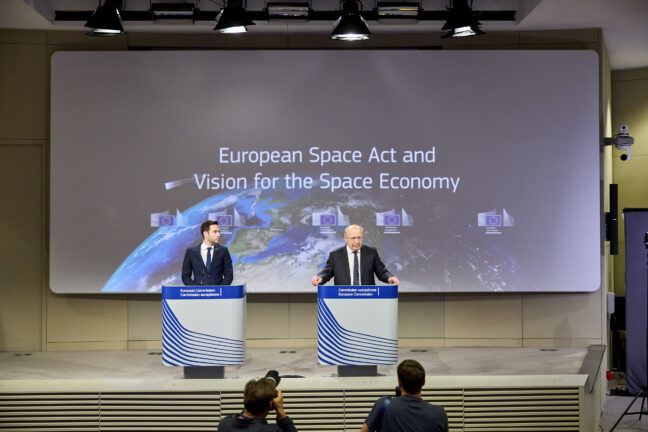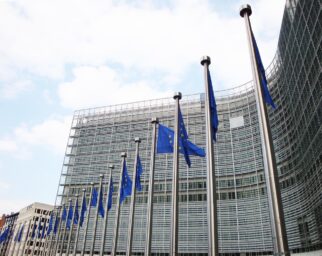The European Commission has introduced the European Space Law on Wednesday, 25 June. The bold legislative proposal—a regulation rather than a directive—aims to end the current patchwork of national regulations stifling the growth of the EU’s space sector.
At the core of the initiative lies a fundamental challenge. Today, twelve different national space laws co-exist within the Union, each with its own rules on licensing, operations, and oversight. This legal fragmentation undermines clarity, increases compliance costs, and ultimately weakens Europe’s global competitiveness. As a senior Commission official explained on Wednesday, any company seeking to operate in multiple EU countries must navigate conflicting legal systems. This obstructs cross-border activity, placing Europe at a disadvantage in comparison to more harmonised global markets.
To address this, the Commission has chosen to propose a regulation that applies directly across all member states, avoiding the legal inconsistencies often introduced by directives. “If we genuinely want to advance as a Union, a regulation is the appropriate tool,” the official said. “In a sector as strategic and sensitive as space, legal coherence is essential.”
Security, resilience, sustainability
The overarching goal is to create a genuine single market for space services. Under the proposed law, once an operator receives authorisation in one member state, it applies throughout the EU. This is to reduce entry barriers, increase legal certainty, and lay the groundwork for future international mutual recognition agreements.
The regulation revolves around three strategic objectives: security, resilience, and sustainability. It aims to enhance space object tracking and ensure the safe deorbiting of satellites at the end of their operational lives. It mandates full lifecycle risk assessments and introduces tailored cybersecurity protocols. Additionally, it requires operators to assess and mitigate their environmental impact. “Applicants will need to submit a technical dossier proving they meet the common minimum requirements. This ensures greater predictability and allows authorities to carry out consistent and comparable assessments,” explained the Commission source.
You might be interested
The law does not directly regulate manufacturing processes. It will, however, inevitably influence the design, materials, and technological innovation of space systems, particularly in terms of environmental and safety compliance.
Strategic sovereignty v. open markets
Foreign operators, such as Starlink and other non-EU satellite service providers, will also be subject to the regulation if they wish to access the European market. “Whether a company is based inside or outside the EU, it must respect our core principles of security, resilience, and sustainability,” the official emphasized.
The Commission also aims to negotiate mutual recognition agreements with third countries. In the absence of such agreements, foreign companies will have to seek EU authorization through a designated competent authority. “The goal is to create a level playing field for all space operators wishing to operate within the European Union, including Starlink and others,” said Andrius Kubilius, EU Commissioner of Defence and Space.
(Latest space developments) are very similar to what happened a hundred years ago with automobiles, and later with the dawn of aviation. – Andrius Kubilius, EU Commissioner of Defence and Space
The regulation also aims to strike a balance between national sovereignty and the rules of the single market. While member states remain free to procure services from companies like SpaceX through bilateral agreements, those services must still comply with EU standards if offered commercially within the Union. “We are not questioning sovereign choices,” the official noted, “but we are committed to establishing a unified legal foundation that strengthens our market and gives European companies the room they need to grow and compete.”
Breakneck speed
Beyond internal harmonisation, the regulation supports the EU’s ambition to become a global standard-setter in space governance. The Union is already active in UN forums on space traffic management and intends to use this regulation as a platform for greater international engagement. “This is about speaking with one voice on the global stage. With common rules, Europe becomes a credible actor not just in commerce, but in space governance as well,” the Commission observed. “Only by establishing a true single market for space can we hope to compete with the US and China.”
Mr Kubilius added that in the next decade, we expect the number of satellites launched to be 2.5 times greater than the total launched in the entire 70-year history of the space age. At the same time, the global space economy is to triple in value to $1.8tn (€1.54tn). “Such a revolutionary development brings enormous new opportunities—but also new risks, new challenges, and new strategic responsibilities,” he said. “It’s very similar to what happened a hundred years ago with automobiles, and later with the dawn of aviation.”











